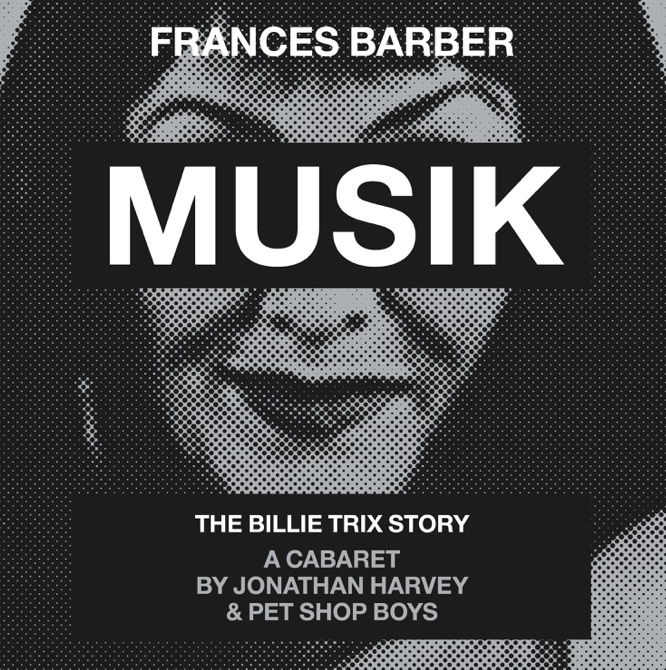The thirst for world domination via musical stardom starts from an early age, and usually stems from a lack of love where one is supposed to get it. So goes the tragic origin story of Musik‘s Billie Trix, born in the postwar ruins of 1945 in Berlin (“I never knew my father/Berlin 1945/He forced himself onto my mother/All she did was stay alive”) before eventually fleeing to New York. It was there, when the city hadn’t been completely fed to the likes of Jeff Bezos, that she fell in with a then unknown Nico and took the advice of Andy Warhol to change her name to something more palatable to Americans than Hildegard.
It is the overt homage to the white-wigged one, “Soup,” that perhaps bizarrely endears Trix’s audience to her even more than the aforementioned “Mongrel” as she discusses all the ways in which soup can be a panacea for the soul (again, she was ahead of the game long before those Chicken Soup for the Soul books came along). That “it won’t let you down when you’re starting to droop and you’re feeling hungry alone and angry” and better still for someone like Warhol, for “if you make it into an artwork you won’t be stuck in a loop.”
But with a new decade comes a new reinvention (and if it’s starting to sound like Madonna to you, well, Billie claims that M ripped off the eyepatch flourish from her as she sports one of her own with a “B” emblazoned on it). So we seem to catapult into the future that is the 70s (with the mention of napalm, Nixon and Mao one just assumes) and beyond. Thus, our satirical cabaret segues into its midpoint (in an hour-long one-woman show with no intermission) with “Run Girl Run.” PSB fans will recognize the track from the duo’s first musical, Closer to Heaven, from 2001 (once again collaborated upon with playwright Jonathan Harvey), in which Frances Barber also appeared as Billie Trix. This time around, the song is seemingly reworked to further lend Barber the ability to mimic the sound of Neil Tennant’s voice through her own signature rasp (that is really just Tennant’s in the end). And as she asks herself, “What’d you wanna be, Joan of Arc on TV? A whore or a nun?” she has the wisdom to know that she has to pick herself out of the wreckage of the 60s to “run, girl, run/You’ll be enshrined in the Guggenheim/The Western art world needs another icon.”
Yet with the irrelevancy of age in the pop and rock music world comes a certain loss of rightful icon status. Or at least recognition and reverence for that status. Through it all, however, there is no denying that, even while being largely talentless save for her claim to friendships with titans like Salvador Dali (she’s billed as a Zelig-like figure, hence her ability to ostensibly transcend various times and spaces), Philip Roth, Damien Hirst and, er, Donald Trump (sort of–apparently his idea for the wall came from an off-handed remark she had made), there is the music. The thing that has gotten her through it all, she thusly croons what has been deemed the standout track of the musical, “Ich Bin Musik” (or “I Am Music” for those not versed in German 101). Asserting, “I am music/Music is me/It’s all that I live for/It’s setting me free/When I’m not dancing I’m still in a show,” Trix’s audience immediately gets the sense that, well, it doesn’t even seem to matter if she actually has one, so long as the world remains her stage she’ll make you her audience regardless.
Yet on “Friendly Fire” (also recycled from Closer to Heaven), a rueful Trix seems to delicately broach the idea that “when fame sustained me and arenas acclaimed me/I floated through life in a cloud of love and insanity and pagan profanity before a worshipping crowd/Now my status is ill-defined.” But it is only a brief moment of exiting her bubble of well-maintained delusion and self-importance. After all, as she states on the final song of the cabaret, “For Every Moment,” “You gotta look ahead/Don’t fear the future/Bury the past or make it your own.” At times, this can be a challenge even for someone as tough (and German) as Billie. Ergo the heavy use of drugs despite insisting she doesn’t do that many as she cuts a line on her tambourine.
“Am I scared? Do I want to go? What does the next chapter hold?” Billie demands as she “checks in with herself.” Who knows and who cares? So long as she manages to carve out another one in the face of what everyone assumed would be a continued lack of pertinency. Now, more than ever though, Billie’s story is one with the stuff of legend we need. If nothing else than to remind these internet-born “stars” what an icon is supposed to be.



















